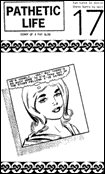Peite ti gnwmi sas kai diabaste allwnwn.
What other genre is as apt to articulate popular dissent, vent "extreme" views, innocuously cover narrow topics, or rant incoherently as the zine? Sometimes loosely understood as being any low-circulation, non-mainstream magazine or newspaper, zines (from "fanzine") are more narrowly self-published periodicals. Usually issued by one person outside the profit motive, they are a budget means of unhomogenized self-expression. Some are cobbled together quickly using office photocopiers; others are carefully designed using the latest in word processing technology. Their content may be sexually explicit, politically revolutionary, or blatantly anti-social. All embody one maxim: freedom of the press belongs to those who own one. Like punk rock, graffiti, and home taping, however, zines are a part of a larger do-it-yourself movement, one that runs beneath if not counter to the prevailing currents. Within this "otherstream", the veritable zine community somehow manages to foster both individualism and interpersonal relations. Zines are produced and traded, then communication begins.
- Chris Dodge (http://www.geocities.com/SoHo/Cafe/7423/zineog2.html)







